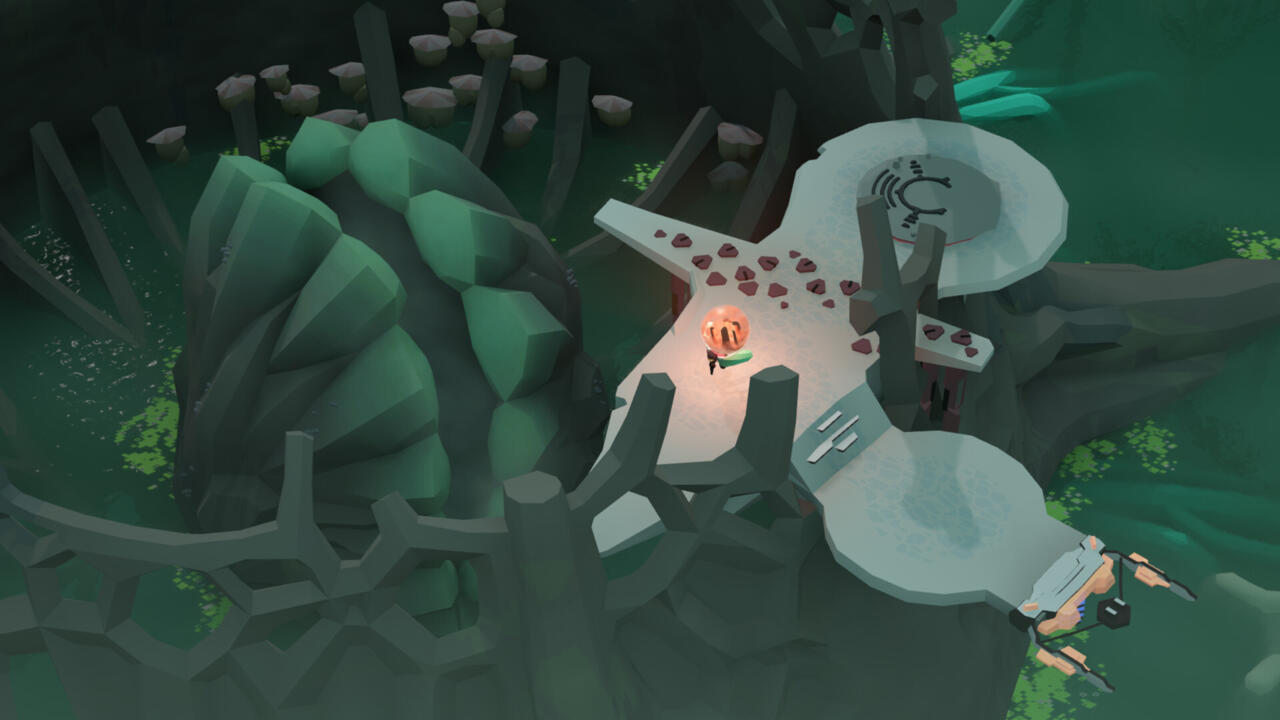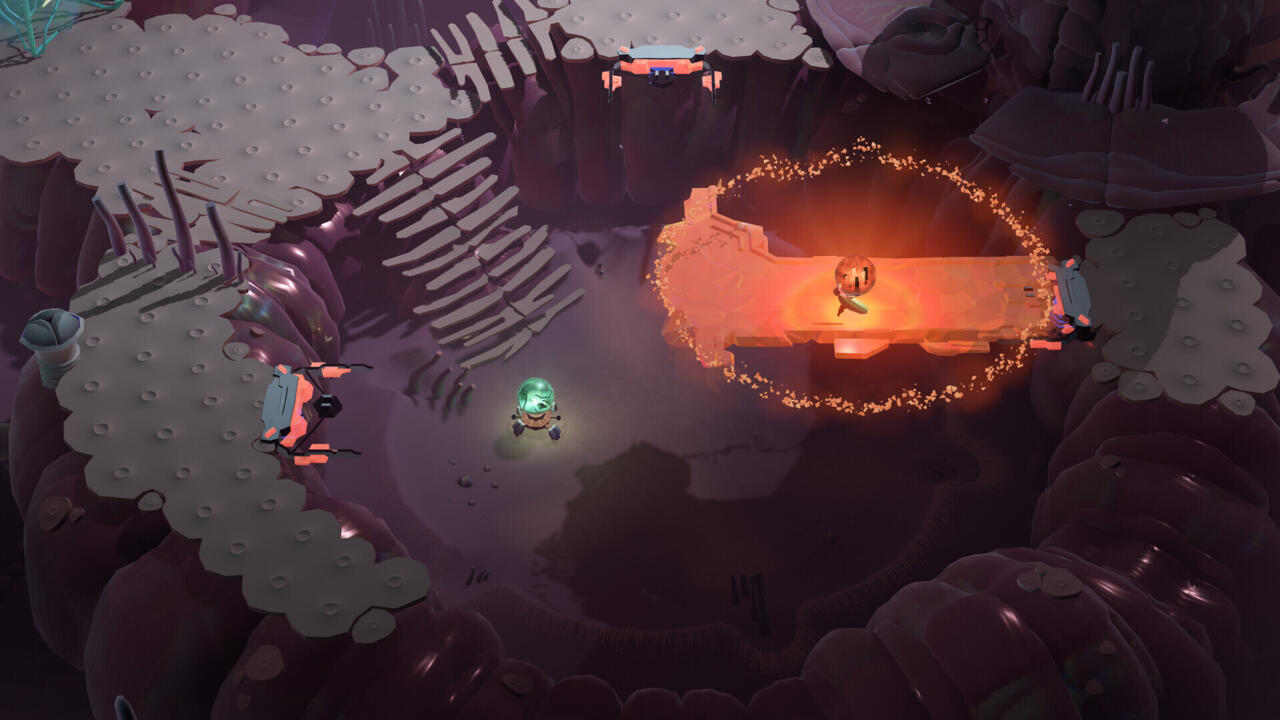I've always been equal parts fascinated and terrified by bugs. These seemingly contradictory sentiments most likely stem from them being a bit contradictory themselves. They are everywhere yet feel foreign, vital to our world's operations yet seemingly insignificant, and small yet capable of improbable feats, whether that be carrying objects 50 times their weight or rendering homes inhospitable. They are disarmingly complex creatures--and it makes them the perfect subject for a game just as intricate as they are.
Cocoon, the debut game from Geometric Interactive, is a surreal and intimate puzzle game that is also beautifully complex. Considering the pedigree of its gameplay designer--Jeppe Carlsen of Limbo and Inside fame--perhaps this shouldn't be too surprising, but it didn't stop me from continuously being in awe of just how tight and intelligent the overall experience was. This, paired with fantastic sound design and art, both synthetic and organic--lush yet scarce--makes for a memorable experience.

Cocoon sees you take on the role of a cicada-like creature moments after it emerges from a womb of petals. Without fanfare, exposition, or any guidance, this creature is thrust into an orange, arid, and largely desolate world. There are few enemies to be found in Cocoon, to be sure, but all of them are relegated to closed off arenas, where you must use quick thinking and evasion to get the best of them. While some of these boss battles are incredibly engaging (and others, not quite as much), combat is not the focus in Cocoon--it's exploration.
In the game's open world, only ancient-looking structures that pulse with strange power keep you company. Your mission, then, is simple: Use these structures to keep pushing forward. Why you are meant to push forward is never made explicit, but it also doesn't feel like it needs to be. There seems to be this intangible force that compels you to--this notion that moving forward is both benevolent and part of the journey you must take.
The way you progress is, on paper, quite simple. The game uses just five buttons--one for each of the four cardinal directions and one to interact--and most structures you encounter are powered on by inserting an orb into the proper place. However, what's theoretically simple can quickly grow complex.
Within these orbs are entire worlds which you can enter by placing them in the middle of a mechanical structure that then reflects the environment in a shallow pool of water. You can seamlessly transition between worlds, and solving puzzles in one will, in turn, help you progress through others. Where it truly gets complex is how often you are required to place worlds within worlds so that situations play out precisely as they need to for you to advance. Additionally, holding on to these world orbs grants you unique powers. When clutching the orange orb, for example, your cicada can reveal paths it wouldn't otherwise be able to walk on, while the seafoam green orb allows you to use what I can only best describe as water elevators.

Timing, utilizing these powers in the right order, and abstract thinking becomes key to progression. There's a logic the game silently teaches you as you solve these puzzles--a set of rules that you learn fairly quickly. But while Cocoon's fundamental mechanics rarely change, the ways in which you use them continue to expand throughout the game. I found myself thinking, "Wait, can I do this?" only to be met with a resounding yes time and time again. It's amazing how something so simplistic can be brilliant--and not only that, but it makes you feel brilliant. Piecing together how the laws of this universe work, and testing to see just how far they extend, is an extraordinary experience--one that keeps your mind engaged and your curiosity piqued.
And while all this might sound complicated (and don't get me wrong, some of the puzzles can be head-scratchers), none of it is overwhelming thanks to the game isolating what you need to be focused on to progress. If an area doesn't relate to the current puzzle you are trying to solve, it will be inconspicuously closed off. This prevents the frustration that can occur in puzzle games where you are frantically backtracking, wondering what small detail you missed or if there was something you did previously that was incorrect. It subtly informs you that you are exactly where you need to be, thus narrowing down all the potential variables to a manageable number.
Subtlety is also a concept that works its way into the game's sound design. While your journey through Cocoon is often quiet, it's a very purposeful silence that builds into swelling compositions, like the bass-heavy track that accompanies boss battles or the gentle motif that plays when you solve a puzzle correctly. But overall, there's an eeriness to Cocoon's sound that is not unsettling, but atmospheric.
This is heightened by the game's art direction, which is full of juxtaposing visuals that create both unease and wonder. Whereas the world is filled with metal structures and perfect geometry, there is also an organic feel to it--this sense that you are within a living organism, brushing up against Golgi bodies, vessels, vesicles, and other apparatuses. Yet these imperfect and bulbous creations manage to feel intricate and intentional as you consider the functions they serve in living things. Another intelligent design choice was assigning a distinct color palette to each of the game's worlds. Considering all the juggling, traveling, and the way Cocoon embraces this idea of recursion, it helps keep you aware of where you are. But while there is an array of different colors, all of them are gently muted, as to create harmony between all these disparate worlds.

It is thanks to its artistic subtlety and lack of an explicit narrative that Cocoon encourages your mind to wander and extract what I believe to be its biggest takeaway and a harsh truth: Our greatest journeys--the ones that give us purpose and guide our personal evolution--are insignificant in the grand scheme of things. And sure, there's a certain sense of powerlessness that sinks in when you try to process that information; it's the same gut-punch feeling that comes when you begin to consider the sheer size of our ever-expanding universe. But there's also liberation. And perhaps most importantly, it doesn't make what we endure and what we become any less valuable to the world we are creating for ourselves. While the game's slightly abrupt ending detracts from this message somewhat, it still manages to come through.
Cocoon, as the name suggests, is a game about self-evolution. From the moment you emerge from the womb-like structure at the game's beginning, pushing forward and learning are your primary focuses--even if what you're ultimately accomplishing feels a bit unclear. But it's also about how the self is but a small part of life--how entire worlds can fit in an insect's tarsal segments. From its puzzles to its visuals, Cocoon is a beautiful game filled with brilliance and meaning, delivered in a subtle yet unforgettable way.